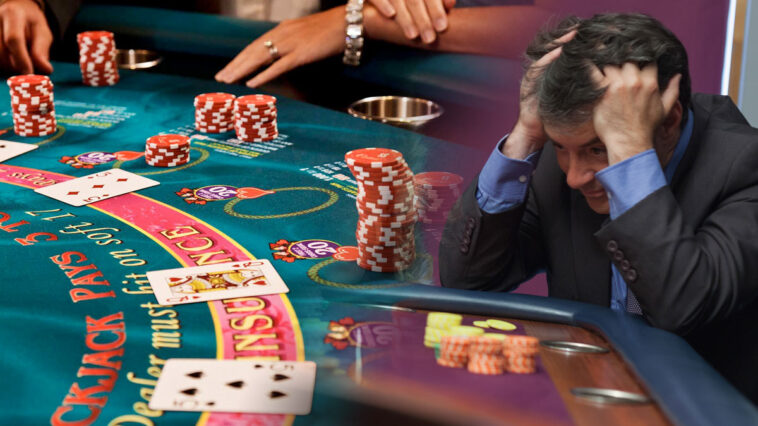If you create the right habits, blackjack can be the best game in the casino. But if you have the wrong habits, blackjack can cost you as much money as some of the worst casino games out there.
Good blackjack players develop good habits. This means you have to learn which habits are bad, so you can correct them. This list if five bad habits that some blackjack players have is a good place to start.
Every bad blackjack habit costs you money. And every good blackjack habit helps you make money. Your blackjack habit lessons start here.
1 – Falling Into the Insurance Trap
Every single time I play blackjack in a live casino or at a live dealer online casino, I see people fall for the insurance trap. Of course, the blackjack dealer makes insurance sound like the best thing ever. After all, what could be better than breaking even when the dealer has a blackjack?
Just like insurance on your house or your car, blackjack insurance is offered to you as a supposed way to protect yourself. But never forget that insurance companies make money, so is it in their best interest or yours? Blackjack insurance is a bad deal for you and a great deal for the casino. I’m going to show you why this is the case using simple math.
- Consider the math when you take insurance on 52 hands. The dealer has an ace showing, and your original wager is $20. You take insurance for an extra $10, and break even on the hand when the dealer has a blackjack.
- I’m using 52 hands because there are a total of 52 possible cards in the deck. You’re playing in a shoe game, so each of the 52 cards has a roughly equal chance of being the dealer down card.
- Your total cost at $10 per hand for the 52 hands is $520. The dealer doesn’t have a blackjack on 36 of the 52 hands, because he or she has an ace to a 9 in the hole.
- This leaves 16 hands where the dealer does have a blackjack, because he or she has a 10 to king in the hole. On these 16 hands, you get back your $10 wager and the $20 payout. This is a total of $30 on each of the 16 hands, for a grand total of $480.
- As you can see, this is a loss of $40 on the 52 hands overall. And this loss is just on the insurance wager. You still have to play your original wager, and you’re at a disadvantage on it because the dealer has the most powerful card in their hand. A hand with an ace, even without a 10 point card with it, is a good hand.
Never fall for the blackjack insurance trap, because it costs you money in the long run.
2 – Risking More Than the Minimum
How much do you risk on each hand when you play real money blackjack? Do you risk the lowest amount possible on each hand? If you’re betting more than the table minimum on any blackjack hand, you’re losing more money than you should.
Even though blackjack is one of the best games in the casino when it comes to a low casino edge, the casino still has an edge. This means that the casino is going to keep a small percentage of every dollar you risk when you play blackjack. And this means that when you risk more, the casino’s take goes up.
If the blackjack game you’re playing has a 1% casino edge and your average bet is $80, you lose on average 0.80 per hand. But if your average bet is $20, you only lose an average of 0.20 on every hand.
The difference of 0.60 a hand doesn’t sound like much, but it adds up quite fast. If you play 100 hands, it adds up to an extra $60 in losses. On 1,000 hands, it adds up to an extra $600 in losses. This is why you need to make the smallest bet amount possible when you play blackjack.
A Single Exception Exists for This Habit:
If you learn how to count cards or use another advantage method when you play blackjack, there are times when it’s correct to risk more than the minimum. In fact, you have to risk more than the minimum to make a profit.
But this is something to consider only after you become an advantage blackjack player. Never risk more than the minimum before this.
3 – Getting Paid 6:5
The worst thing that ever happened to blackjack players was when the casinos decided to try offering 6:5 on some tables instead of 3:2 for a blackjack. If blackjack players had refused to play on the 6:5 tables, the casinos would have quit offering them. But the players still played.
You can’t afford to get in the habit of playing blackjack when it only pays 6:5. I’m going to show you how much this costs you with a short example.
You’re playing blackjack and using an average bet amount of $20 per hand. Over time, you get a blackjack 724 times. This might be over the course of a year or two years, or whatever. It doesn’t matter how long it takes.
When you get paid 6:5, you get $24 on a $20 wager. When you get paid 3:2, you get $30 on a $20 wager. This is a $6 difference every time you get a blackjack. Multiply the $6 difference times 724 hands to get the extra amount you would win with 3:2 instead of 6:5. $6 times 724 is $4,344.
As you can see, the 6:5 habit is costing you a bunch of money. And the only thing you have to do to break this habit is refuse to ever play 6:5 blackjack again.
4 – Not Doubling Down With an Advantage
This bad habit and the bad habit covered in the next section both have to do with using strategy when you play blackjack. When you use the best strategy when you play blackjack you give yourself the best chance to win.
When you consider whether or not to double down, you should double down when you have the best chance to win. You get twice as much money in play, and when you have an advantage, it makes you more money to get twice as much money in play.
On the other hand, if you don’t have an advantage and put twice as much at risk, it costs you money.
When you have a total of 11 and the dealer has a 6 showing, you have a big advantage in the hand. Any card you receive of 6 to king gives you a strong hand that’s likely to beat the dealer. And even if you draw an ace to 5, the dealer still has a good chance of busting.
This is why the correct strategy with an 11 against a dealer 6 is to double down. In fact, the correct play is to double down with a 9, 10, or 11 every time the dealer is showing a 3, 4, 5, or 6.
Get a strategy chart to see all of the hands where you have an advantage and should double down.
5 – Not Splitting Correctly
Splitting pairs also involves strategy, and a strategy chart shows when splitting is the best play. When you split, you put an extra wager in play, just like when you double down. So, if you make a mistake, it costs you money.
As a general rule, you should split pairs of eights and aces all of the time. And splitting pairs of fives and 10s is never a good idea. A good strategy chart shows every possible pair and when they should be split and when they shouldn’t be split.
Conclusion
The worst blackjack habits are going to cost you a great deal of money. The good news is that it’s easy to correct the worst habits once you learn to identify them. Start with correcting any of the five bad blackjack habits listed in this article.
The insurance trap costs you a great deal of money, and the 6:5 issue can cost you thousands every year. These two habits can be fixed immediately.
It’s tempting to bet too much, especially if you’re losing, but never give in to this temptation. Stay with small risk amounts at all times.
The last two bad habits listed on this page are both solved by learning and using the best basic blackjack strategy.
Michael Stevens
Michael Stevens has been researching and writing topics involving the gambling industry for well over a decade now and is considered an expert on all things casino and sports betting. Michael has been writing for GamblingSites.org since early 2016. …





